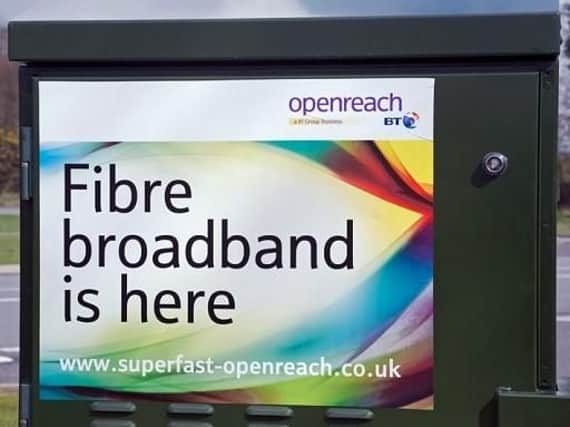BT told to open up Openreach network to speed up rollout of superfast broadband


The regulator said BT must open up Openreach, which provides the final mile of network connection into consumers' homes, to allow rivals to build their own advanced fibre networks connected directly to homes and offices.
Ofcom stressed it had "absolutely not" ruled out full structural separation but was looking at alternatives to achieve the same goals more quickly and with potentially less disruption to consumers.
Advertisement
Hide AdAdvertisement
Hide AdThe regulator's Strategic Review of Digital Communications - its first significant review of the telecoms sector for a decade - said evidence showed Openreach "still has an incentive to make decisions in the interests of BT, rather than BT's competitors, which can lead to competition problems".
It has outlined a new strategy to promote large-scale roll-out of new ultrafast broadband networks, based on cable and fibre lines, as an alternative to the partly copper-based technologies being planned by BT.
It said supporting investment by rival providers would reduce the UK's reliance on Openreach and increase competitive pressure on its network.
The plans mean Openreach will have to open up its telegraph poles and ducts - the underground tunnels that carry telecoms lines - to allow rivals to build their own fibre networks.
Advertisement
Hide AdAdvertisement
Hide AdOfcom said: "Openreach must make it much easier for competitors to access this network, and provide comprehensive data on the nature and location of its ducts and poles.
"This new 'digital map' of the UK will allow competing operators to invest, plan and lay advanced networks, giving people more choice over how they receive their phone and broadband services."
The regulator also outlined plans to introduce tougher rules on faults, repairs and installations, transparent information on service quality and automatic compensation for consumers when things go wrong.
It said it would work with the Government to deliver a new universal right to fast, affordable broadband for every household and business in the UK and also intends to introduce new obligations in future spectrum licences to improve rural mobile coverage.
Advertisement
Hide AdAdvertisement
Hide AdOfcom chief executive Sharon White said: "People across the UK today need affordable, reliable phone and broadband services. Coverage and quality are improving, but not fast enough to meet the growing expectations of consumers and businesses.
"So today we've announced fundamental reform of the telecoms market - more competition, a new structure for Openreach, tougher performance targets, and a range of measures to boost service quality.
"Together, this means a better deal for telecoms users, which will improve the services and networks that underpin how we live and work."
Dan Howdle, telecoms spokesman at broadband and phone advice site Cable.co.uk, said Ofcom's recommendations for Openreach would be a blow to competitors such as Sky, TalkTalk and others who had long campaigned for a split.
Advertisement
Hide AdAdvertisement
Hide AdHe said: "Ofcom's decision to open up Openreach's poles and tunnelling to competitors and to give them more say in future strategic and budgetary decision-making goes halfway to alleviating competitor complaints, but stops short of addressing the prime concern.
"A recommendation to split would have absolutely been the right decision for the UK broadband industry but, in the short term at least, perhaps not for the 2.5 million UK homes that do not currently have access to superfast broadband."
BT said: "Ofcom have today explained why breaking up BT would not lead to better service or more investment and that structural separation would be a last resort. We welcome those comments.
"The focus now needs to be on a strengthened but proportionate form of the current model and we have put forward a positive proposal that we believe can form the basis for further discussions with both Ofcom and the wider industry.
Advertisement
Hide AdAdvertisement
Hide Ad"Our proposal includes a new governance structure for Openreach as well a clear commitment on investment. Openreach is already one of the most heavily regulated businesses in the world but we have volunteered to accept tighter regulation to bring matters to a clear and speedy conclusion."
BT said it was happy to let other companies use its ducts and poles "if they are genuinely keen to invest very large sums as we have done", adding that they had been open to competitors since 2009 but had attracted little interest.
It said: "We are keen to understand and address Ofcom's concerns so we will review their paper in detail.
"A great deal of what they are proposing is already in place and we are open to discussions about how the current rules can be amended and updated. A voluntary, binding settlement is in everyone's interests and we will work hard to ensure one is reached."
Advertisement
Hide AdAdvertisement
Hide AdWhich? executive director Richard Lloyd said: "People now see telecoms as essential services, so we welcome proposals to raise standards across the industry, with faster, more reliable broadband and automatic compensation for consumers when things go wrong.
"Ofcom must move quickly with these reforms and ensure that Openreach genuinely improves the service for customers who have been let down for too long."
TalkTalk chief executive Dido Harding said: "Ofcom has done well in identifying many of the worst problems, including recognising, finally, that BT's control of Openreach creates a fundamental conflict of interest which hurts customers.
"But, having accepted all this, Ofcom has produced 100 pages of consultation with little concrete action behind it. The risk is that we end up with 10 more years of debate and delays, rather than facing into the problems and delivering improvements for frustrated customers now."